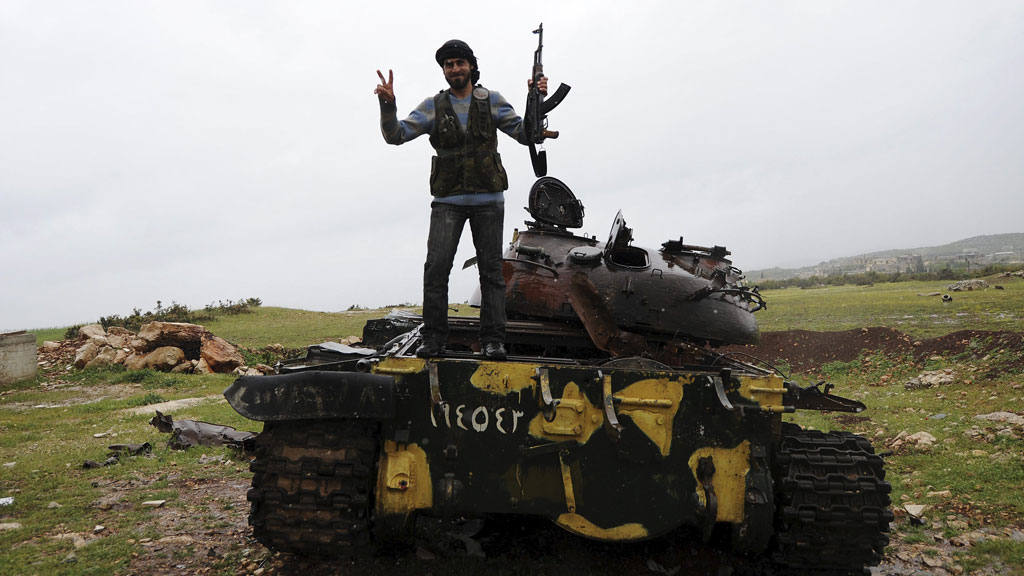Why Syria’s rebels need to combat Assad’s air power
As the EU lifts its embargo on arming Syria’s rebels, what weaponry do the anti-Assad forces need in their fight against the regime?

In response to the announcement by EU foreign ministers, Russia said on Tuesday that it would supply the Syrian government with anti-aircraft missiles, in addition to the anti-ship armaments it is reported to have sent to Damascus.
Russian Deputy Foreign Minister Sergei Rybakov said this would help to deter “hotheads” from intervening in Russia, accusing the EU of “throwing fuel on the fire” by relaxing its arms embargo.
The Syrian military is dependent on Russia for its heavy weaponry: Damascus has Moscow to thank for its thousands of tanks, hundreds of aircraft and artillery units. It is also receiving help from Iran and Hezbollah.
In contrast, the Syrian opposition is under-resourced and has to contend with Assad’s air superiority.
‘Game changer’
In this context, portable surface-to-air missiles and anti-tank weapons “would be a game changer”, according to Professor Michael Clarke, director general of the Royal United Services Institute.
Professor Clarke told Channel 4 News: “But we would not give them ours. Down the road these could well turn up being used against western forces at some point, which would be politically embarrassing.”
Dr Reinoud Leenders, from the department of war studies at King’s College London, told Channel 4 News: “They are basically defenceless against any airborne strikes.
“Anything that shoots down aircraft is wanted by any rebel in Syria, but this is a controversial weapon.
“From a military perspective, I think that is what the UK and French governments have in mind. But it depends on a judgment call about whether anti-aircraft weapons will end up in the wrong hands.”
Prof Clarke envisages a senario in which heavy weapons are sent to the Syrian rebels via the Gulf, with Britain and France supplying communication equipment, following the precedent set in Libya during the successful uprising against the Gaddafi regime.
But this would mean special forces on the ground to train the rebels in the use of the equipment.
Jihadis’ weapons
Prof Clarke believes it is inevitable that some weapons will be captured by jihadis the British government is keen to avoid.
“A proportion of them will end up in the hands of the bad guys and how big a proportion will depend on time and chance. Weapons don’t go out of circulation when the fighting stops; they get used somewhere.”
A paper from the International Institute for Strategic Studies (IISS) says: “To be sure, the Syrian military has no shortage of hardware, a capable air defence system, thousands of tanks, a dozen fighter squadrons, around 30 coastal craft, Scud missiles and chemical weapons.
“But they are only partially modernised and most army units are probably poorly trained. Syria’s air defences are far greater than those faced last year by Nato air forces over Libya.”
Diverted by Islamists
Syrian rebel groups are receiving military help at the moment from Saudi Arabia and Qatar in the form of machine guns and rocket-propelled grenades to take out tanks and other armoured vehicles.
Dr Leenders said these weapons were supposed to have gone to the Free Syrian Army, but some were likely to have been diverted by Islamists. “The US is tolerating this. It has outsourced the arming of the rebels.”
The IISS paper says “weaponry is making its way from North Africa into Syria through third nations, with the silent acquiescence of western nations”.
It adds: “Still, rebel commanders insist that most of their arsenal is brought with defectors, looted from army barracks, bought from corrupt army soldiers or the black market, or manufactured in workshops.”
‘Flexibility’
Foreign Secretary William Hague said the relaxation of the EU embargo did not mean Britain would arm the Syrian opposition, “but we now have the flexibility to respond in the future if the situation continues to deteriorate and if the Assad regime refuses to negotiate”.
Even if the British and French governments make communications equipment available to the Syrian rebels, as they did in Libya, we are not looking at a repeat performance.
Back in 2011, the RAF bombed Gaddafi’s forces and, in Prof Clarke’s words, “Nato acted as the air force for the rebels”. That does not appear to be on the cards this time.